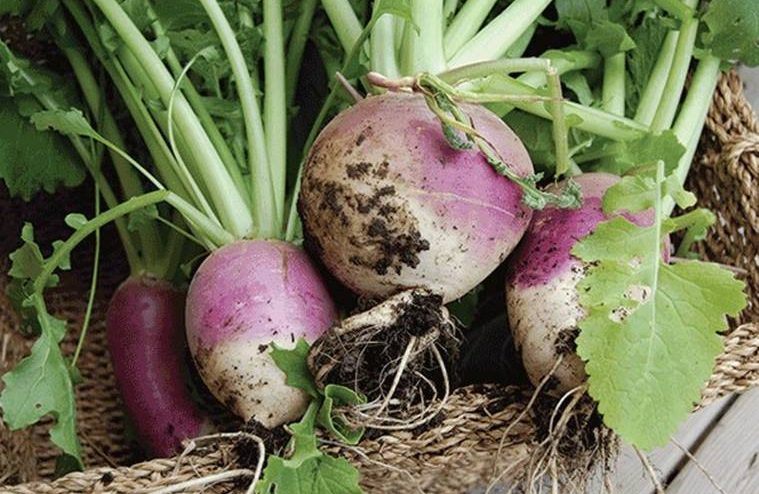
Millbank Farm is one of Ireland’s leading turnip and leek producers. Based in Killinchy on the western shores of Strangford Lough in Co. Down, the farm has been growing and selecting only quality fresh produce for over 40 years.
Originally beef and dairy farmers, the McGowan family has been involved in commercial turnip production since the 1970s with Adrian McGowan now following in the footsteps of his father Bert and uncle Jack. The rich soil and natural drainage of the area combine to produce excellent growing conditions.
“There has been a tradition of early potato and vegetable growing in this region going back generations. It’s drumlin country here where the soil is ideal for growing vegetables,” explains Adrian, who is also vice-chairman of the Ulster Farmers’ Union’s Vegetable Committee, which represents about 20 vegetable growers from around the province.
Adrian grows 90 acres of turnip and a further 20 acres of leek along with 100 acres of cereals such as barley and oats. He also keeps about 100 sheep on grassland. In total, he farms 300 acres in Killinchy and in nearby Downpatrick where he has land taken. Because the soil gets tired when turnips and leaks are grown in the same fields year after year, the land is rotated to ensure a better, disease-free crop.
“It makes sense to grow in different fields every year. It gives us the best chance of producing turnips and leeks of the highest quality and minimises the risk involved,” he adds.
Millbank Farm produces about 25 tonnes of turnip and eight-to-10 tonnes of leek per acre each year. The turnips are planted in April and May and harvested between mid-July and early April (every day in the summer and every second day in the winter). The leeks are planted under glass in February and March at John Gabbie & Sons’ plant propagation nursery in Comber, Co. Down before being transplanted outdoors in April. They’re harvested between late July and May.
Once harvested, the produce arrives into the pack-house where it is chilled, washed, trimmed and ready for dispatch. The aim is to get the produce in and out to the customer as quickly as possible. For the past four years, the turnips have been grown under netting and this has resulted in a more consistent crop when it reaches maturity.
“Putting down the netting is time-consuming – it’s like a big patchwork. But it helps to keep the slugs at bay. Pesticide control is a huge issue for every grower. This year, there were an unusually high number of diamondback moths who were difficult to control.”
The main turnip varieties grown on the farm are Magres and Boras, with new varieties being trialled on an ongoing basis. The leek varieties grown are Duraton, Lexton and Pluston. The produce make their way onto the shop shelves via Meade Potato Company in Co. Meath and Mash Direct in Comber to name but two suppliers.
“Our turnips and leeks are packed full of flavour with a real freshness you can taste. We take pride in growing and preparing them for the consumer,” Adrian says.
“There is still a big demand for whole turnip, despite the growing popularity of processed vegetables. Turnips are one of the oldest and most widely eaten vegetables which have held their popularity very well in Ireland. They’re a wholesome, healthy, nutritious and delicious vegetable that can be eaten with any meal. They’re a good source of fibre, vitamins A, C and folic acid.
“Leek is becoming increasingly popular as a vegetable and is in demand all year round. They are low in fat and calories, and taste great.”
Adrian is full of praise for his five staff, noting: “We have a great team here. Our staff are all locals who have been with us for a long time. They’re hard-working and very good at what they do. We also use local agri contractors for ploughing, sowing and spraying. Our staff and our customers are the most important people for us.”
Adrian and his wife Patricia have three daughters – Suzanna, Victoria and Emily. Agriculture student Emily is considering establishing a poultry unit on the farm, something which her father would fully support.
“It’s no harm to diversify and to try other farm enterprises. Vegetable growing is constantly evolving and you have to evolve with your market. You also have to grow the right amount for your market. Overproduction could put you out of business.
“It’s not all about growing. It’s about selling as well and having a market for your produce,” the affable grower concludes.
Millbank Farm
11 Mill Road,
Killinchy,
Newtownards BT23 6TJ
Telephone: +44 (77) 98730403
Taken from Irish Tractor & Agri magazine Vol 5 No 3, April/May 2017